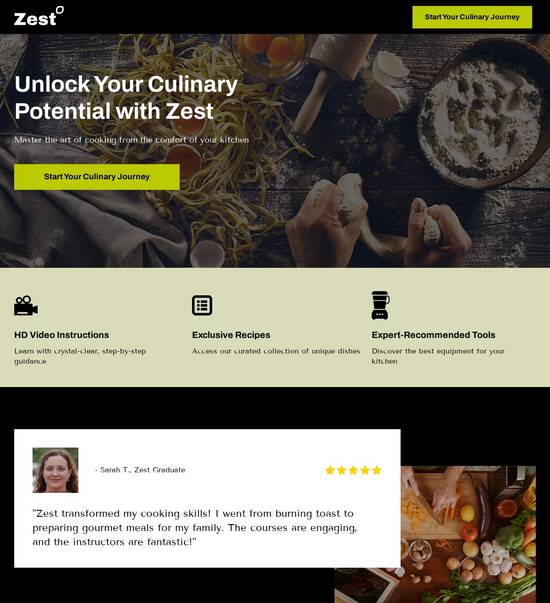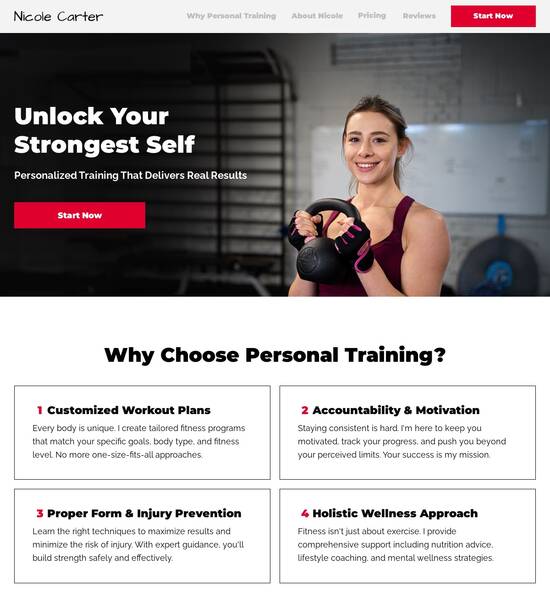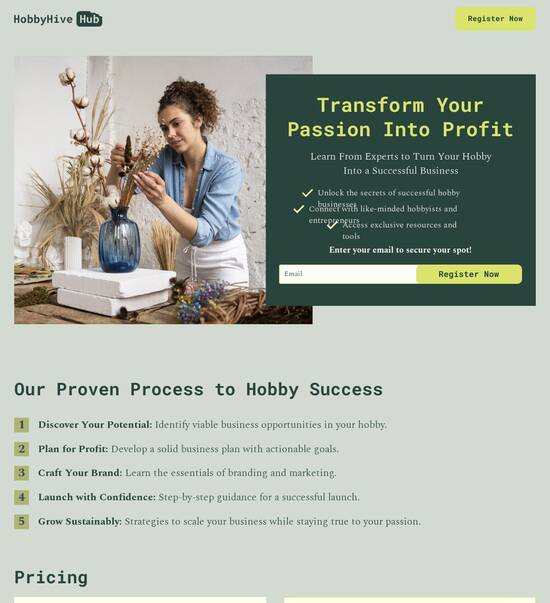
Angular.js optimized travel booking page template
Explore Similar TemplatesAbout template
Supercharge your travel booking page with Angular.js for outstanding performance! Learn more today.
Recommended templates

Easy to build without coding
With the intuitive drag-and-drop builder, anyone on your team can create high-converting pages without any knowledge of code or design. Make enhancements to your landing page with custom widgets using Javascript, HTML/CSS, or third-party scripts.

Multiple layouts for any industry and goal
Select from 500+ landing page layouts built to boost conversions across industry-specific scenarios. Customize them by adjusting fonts, adding images, and generating on-brand content with the AI assistant. Quickly scale with Instablocks® and Global Blocks that you can save, reuse, and update globally.

Loads fast and looks polished on any device
Every template is responsive, which means they present professionally on any device and load blazingly fast with our Thor Render Engine. You can also power them up with Google AMP technology to deliver an unparalleled mobile experience and drive higher conversions.

Robust analytics & experimentation
Get real-time updates and reporting across all your devices, showing the number of visitors, conversions, cost-per-visitor, and cost-per-lead. Launch AI-powered experiments, run A/B tests, and use heatmaps to analyze user behavior, then optimize your landing page to maximize conversions.







Easy to build without coding
With the intuitive drag-and-drop builder, anyone on your team can create high-converting pages without any knowledge of code or design. Make enhancements to your landing page with custom widgets using Javascript, HTML/CSS, or third-party scripts.
Multiple layouts for any industry and goal
Select from 500+ landing page layouts built to boost conversions across industry-specific scenarios. Customize them by adjusting fonts, adding images, and generating on-brand content with the AI assistant. Quickly scale with Instablocks® and Global Blocks that you can save, reuse, and update globally.
Loads fast and looks polished on any device
Every template is responsive, which means they present professionally on any device and load blazingly fast with our Thor Render Engine.
Robust analytics & experimentation
Get real-time updates and reporting across all your devices, showing the number of visitors, conversions, cost-per-visitor, and cost-per-lead. Launch AI-powered experiments, run A/B tests, and use heatmaps to analyze user behavior, then optimize your landing page to maximize conversions.
All the features you need to build lead-generating landing pages
Explore more featuresLearn how to build top-performing landing pages for any goal
FAQs
Leading the way in building high-performing landing pages





A comprehensive guide to the Instapage landing page and CRO platform
Instapage is a leading solution for marketers looking to enhance their landing page strategies and optimize conversion rates. This guide will walk you through the essential steps to leverage Instapage's capabilities, empowering you to create high-converting pages that align with your promotional goals. Discover how to utilize templates, optimization techniques, and data-driven insights to elevate your campaigns.
Understanding landing pages and conversion rate optimization
Landing pages serve as critical components in most digital marketing campaigns. They are designed to capture leads, convey essential information, and persuade users to take action. With Instapage, you can create tailored landing pages that not only align with your audience's needs but also integrate innovative CRO features to maximize conversions.
- Efficient lead capturing: Instapage offers built-in lead generation elements such as forms and CTA buttons directly integrated into the landing pages.
- Personalized experiences: Utilize dynamic text replacement to ensure that users feel the content is directed especially at them.
- A/B testing capabilities: Instapage's experimentation features allow you to test different versions of your pages to see which perform best.
Step-by-step landing page creation process
Creating a landing page on Instapage is a straightforward process that ensures efficiency. Follow these steps to build a compelling landing page.
- Choose a template: Select from over 100 high-converting templates that resonate with your audience.
- Customize your design: Use the intuitive drag-and-drop builder to tailor the page to your specific needs, ensuring it reflects your brand.
- Set up tracking: Implement tracking pixels and analytics tools to gather data on visitor behavior.
Optimizing for better performance
Once your landing page is live, optimization is key to improving conversion rates. Instapage provides everything you need to analyze and enhance your pages effectively.
- Heatmaps: Use heatmaps to understand how users interact with your content and where they spend most of their time.
- A/B testing: Regularly test variations of your pages to discover which elements drive the best results—adjust images, CTAs, and copy accordingly.
- Engagement metrics: Review the analytics dashboard for insights on user engagement and behavior to inform future changes.
With these strategies in place, you can expect to see significant improvements in your conversion rates and ROI.
Ready to take your digital campaigns to the next level? Explore how Instapage can transform your approach to landing page creation and optimization today!
AngularJS optimized travel booking page template
Understanding AngularJS: The framework behind travel booking page templates
AngularJS is a popular JavaScript framework developed by Google, designed to create dynamic web applications with ease. It allows developers to build powerful single-page applications (SPAs) that offer a seamless user experience without reloading the entire page. AngularJS operates on the model-view-controller (MVC) architecture, which helps separate business logic from user interface code, making it easier to manage and maintain code.
One significant advantage of using AngularJS is its two-way data binding feature. This means any changes made in the user interface are reflected in the model and vice versa, ensuring real-time updates. Other benefits of AngularJS include its ability to extend HTML with custom attributes, built-in dependency injection, and support for reusable components, which are all essential for creating compelling travel booking experiences.
Single-page applications play a pivotal role in travel booking websites. Users expect quick and responsive interfaces where they can search for flights, accommodations, and other travel services seamlessly. SPAs reduce loading times and improve usability, allowing users to interact with various components without leaving the page. For marketers in travel and hospitality sectors, this means higher engagement and ultimately better conversion rates.
Designing for the user experience: A focus on travel booking interfaces
An intuitive interface is crucial for online travel booking. It not only guides users through the booking process but also enhances their overall experience, making it more likely that they will return. A clean, user-friendly design helps minimize the frustrations often associated with travel planning, which can be a complex task for many users.
Key features that enhance the user interface include the following:
Fast load times
AngularJS excels at handling asynchronous requests, ensuring that users won’t experience frustrating delays while searching for options.
Responsive design
With AngularJS directives, developers can create responsive layouts that adapt to both mobile and desktop devices, catering to travelers on the go.
Dynamic content
Using AngularJS's variable binding capabilities keeps users engaged, allowing them to see real-time updates and recommendations based on their inputs.
Building an optimized travel booking page: Core components
Creating an optimized travel booking page necessitates a focus on essential components that facilitate user interaction. These elements must work together to deliver an efficient booking experience. Some of the essential elements to include are:
Search bar
Incorporate modern technologies that allow users to filter and search for flights, hotels, and rental cars based on specific criteria.
Date picker
Enhance interactivity with custom directives that let users select travel dates easily, minimizing input errors.
Booking summary
Utilize AngularJS controllers to display user selections dynamically, providing a clear overview of their choices before finalizing the booking.
Best practices for structuring AngularJS components also include organizing controllers, directives, and services in a way that supports scalability. This clear separation allows teams to manage updates and enhancements without needing to overhaul the entire system. Utilizing version control is essential when collaborating on projects, which helps maintain consistency and track changes effectively.
The power of optimized APIs: Connecting booking systems and services
APIs play an essential role in travel booking applications by acting as the bridge between the web application and the various travel service providers. By understanding how to effectively collect data from APIs, developers can ensure that users have access to the latest flight schedules, availability, and pricing.
Management of API responses and error handling is crucial for maintaining a smooth user experience. Best practices for working with APIs include:
Data validation
Always validate the data received from the API to ensure its accuracy and reliability.
Error handling
Implement robust error handling to provide informative messages to users in case of failures, which helps maintain trust.
Caching data
Leverage local storage or session storage to cache frequent requests, improving load times for repeat visitors.
Previews and testing: Ensuring functionality and usability
Before launching a travel booking page, implementing preview features allows users to see their selections in real-time. Immediate feedback mechanisms help ensure a more satisfying user experience. However, it’s equally important to prioritize testing to ensure functionality and usability across devices.
Two distinct methodologies for testing AngularJS applications include:
Unit testing
Focuses on testing individual components such as controllers and directives to ensure the desired functionalities are met.
End-to-end testing
Simulates real user scenarios throughout the booking process, providing insights into potential user journey issues.
Enhancing engagement through Q&A and community feedback pages
Creating a Q&A section to capture user questions fosters engagement by allowing users to seek advice and share experiences. This section should be easy to navigate and searchable, empowering users to find answers quickly.
Leveraging community-driven insights can guide future improvements to service offerings. Presenting user-generated content and reviews on booking pages not only enhances credibility but also instills a sense of trust among potential customers. Key aspects to consider include:
User reviews
Showcase user feedback prominently to influence decision-making for new customers.
Q&A format
Structure the Q&A section intuitively to address frequent inquiries or concerns.
Community ratings
Integrate a rating system for services that allows users to weigh in on their travel experiences.
Customizable variables: Tailoring the experience
AngularJS enables the usage of customizable variables that adapt the booking experience based on user preferences. By strategically employing these variables, developers can create a more personalized interaction for users, leading to improved satisfaction.
Effective strategies for optimizing content based on user behavior include:
Behavior tracking
Implement tracking methods that log user interactions, preferences, and selections to refine future recommendations.
Dynamic content delivery
Use AngularJS's capabilities to deliver content tailored specifically to users based on their prior actions.
Location-based suggestions
Leverage geolocation services to present travel options and offers relevant to the user's location.
Contextual learning: Integrating knowledge into booking experiences
Integrating educational content within the booking flow helps travelers make informed decisions. This can include travel tips, destination insights, and important usage instructions that enrich the overall experience.
Using contextual tooltips and modals allows for delivering necessary information without overwhelming the user. Ensuring these elements are non-intrusive yet informative is key to keeping users engaged and informed.
Collaboration and team dynamics: Working together on AngularJS projects
When developing an AngularJS application, the importance of clear communication cannot be overstated. In a development team, ensuring that everyone understands project objectives and guidelines enhances productivity and fosters a collaborative environment.
Utilizing frameworks and tools is vital for project management. Consider incorporating collaborative platforms that allow real-time editing and feedback. Effective project management strategies include:
Daily stand-ups
Implement brief daily meetings to discuss progress and roadblocks among team members.
Code reviews
Regularly review code collaboratively to maintain standards and enhance knowledge across the team.
Feedback loops
Establish structured methods for team members to give and receive constructive feedback.
Rules of effective travel booking pages: Establishing best practices
Compliance with data protection regulations in travel booking is crucial. Adhering to regulations such as GDPR ensures that user data is handled responsibly, which is a key factor in building user trust.
Moreover, establishing visual and functional rules enhances the reliability of the travel booking page. Adopting best practices includes:
Consistent design elements
Maintain a uniform design across all pages to improve user familiarity and minimize confusion.
Clear calls to action
Ensure that buttons and links are strategically placed and easily identifiable, guiding users toward the next steps.
Trust indicators
Display trust badges, user reviews, and security symbols prominently to enhance user confidence.
Innovating with advanced technologies: Future-proofing travel booking templates
As the digital landscape shifts, integrating advanced technologies can provide a competitive edge in travel booking templates. The role of Artificial Intelligence (AI) is steadily increasing, improving user experiences through personalized recommendations based on past behaviors.
Machine learning algorithms can analyze vast amounts of travel data to predict user preferences. This personalized approach enhances the chances of successful conversions as users will be presented with options that matter to them. Anticipating future technologies will keep booking pages relevant and efficient.
Beyond the code: Building a supportive collectives and communities
Finally, fostering a network of developers and stakeholders allows for the sharing of insights and best practices. Organizing workshops and roundtables is an excellent way to address knowledge gaps, further nurturing growth within the community.
Additionally, engaging with online forums facilitates ongoing support and collaboration. As developers share their experiences and resolve issues together, the community becomes stronger, ultimately benefiting the entire industry of travel booking.
Ready to skyrocket conversions?
Supercharge your ad campaigns with high-performing landing pages
Get started














